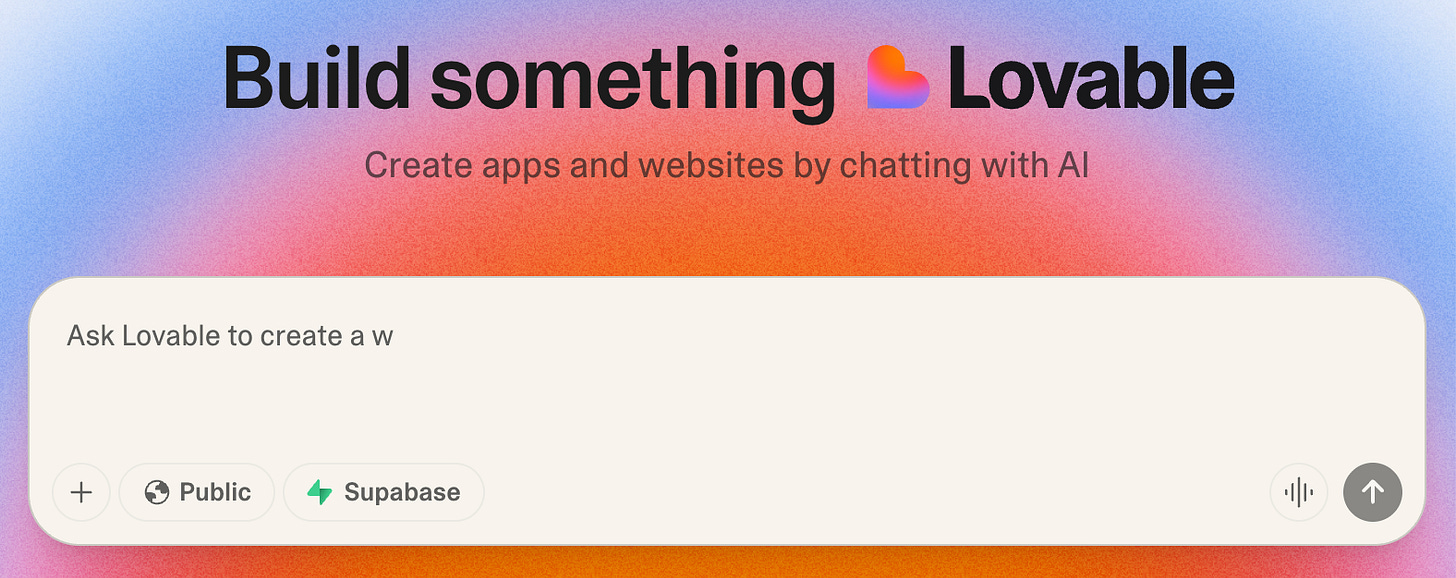Google already won the agents war
Distribution really is king.
I’m calling it.
Google will win the Agentic browser wars by default.
Distribution is king. Google is the meta.
Everyone can see, the browser is the operating system for agents.
Comet. Dia. Now Gemini.
Google owns ~69% of the browser market with Chrome. It’s free. It works.
They own Android OS.
They also own search.
Let’s call that the ‘work layer’.
Yes, every company is commoditising the big white box, made famous by Google. You know, this one:
With various adaptions like:
Lovable
V0
Perplexity
You get the gist.
But I truly believe that UI sameness is a red herring.
Owning where agents run is the moat.
I’ll explain why.
For that we’ll need to go back a bit. Three dates matter.
December 11th, 2024. Google unveils Gemini 2.0 (thank god the name Bard’s gone) and Project Mariner as a research prototype.
May 20th, 2025. AI Mode is search starts actually doing real things. Buying tickets through Ticketmaster, making restaurant reservations on Resy and booking appointments on platforms like Vagaro.
September 18th, 2025. Literally a couple of days ago. Google switches on Gemini inside Chrome browser in the US and previews agentic browsing from the omnibox.
Huge.
Huge. Huge. Huge.
Why huge?
Well, the Project Mariner (research preview name given to Chrome agentic browser functionality) is basically a system of work.
The ‘work layer’, as described by Menlo Ventures, in their article.
It’s orchestration. It’s tool use. It’s context.
It’s, let’s say it all at once. The reason distribution is so powerful.
If agents run where people already type and click, you don’t need a new interface. A new browser.
Comet. Meh. I’ll have to learn to use it. More importantly, I’ll have to learn to trust it.
Dia. What even is that.
Safari? Apple? Well, maybe. If something even gets released.
Also, right now Google is still the default search (for now).
Everything will now start and finish inside Chrome and search.
No open-web hand off.
What will happen?
The google ‘omnibox’ will become a task bar. It will do the following.
AI mode will fan out the query to partner sites.
It will fill the forms it needs to, with human in the loop confirmation.
Close the loop in Chrome.
Find a way to monetise the loop.
Bundle.
Tier.
Profit.
End to end Google.
It’s the classic default play in distribution. Start where the user starts.
DMA choice screens will reduce this power in Europe. Distribution power will vary by region.
Perhaps this is where Comet will thrive. Who knows.
Doesn’t really matter. The global market minus Europe is still bigger and it’s not like they can’t play in Europe.
It’s also a data loop. Every logged workflow is a reusable asset. Where it succeeds. Great.
+1 Trust score.
Where it doesn’t and fails because of a faulty site?
-1 Trust score.
This sort of data stops an Agent from hitting CAPTCHA. Stops it from going to places it shouldn’t.
It forms trusted, predictable flows.
Lastly, it provides some serious ARPU.
They’ve already stacked a price ladder under it.
Broad Gemini-in-Chrome is free. Google AI Pro sits at $19.99/month and is already showing up in some carrier bundles.
Get one year free with a Pixel phone (this is not an ad, I promise.)
If you want Mariner and early Agentic features, you’ll need Ultra at $249.99/month. Thrown in free, storage and YouTube premium.
Sell the door for free. Monetise the power users who teach once. Carriers and OEMs get attach.
Google gets that sweet, sweet ARPU.
But. Remember. It may not work.
The ambition is clear from Google but it’s not yet global. We don’t know if they’ll execute well. I’m pretty sure they will, but it’s not checkmate yet.
Agents do the dirty work, but right now, not that well. Finish rate for agentic tasks will be the hinge metric for their status as Agent OS. We know why Agent’s hallucinate, but it hasn’t been fixed.
Pricing. $249.99 is a lot of money. Not everyone’s going to be an early adopter. If someone else provides an equal, price advantageous and more habit forming experience (maybe OpenAI), maybe with their own $20 bundle, that’s a hard battle to fight back.
Another banger question…
Who gets first contact (distribution rights) if the agent runs at the OS layer instead of the browser?
Apple can move the work layer above Chrome with Siri level app actions and Apple wallet.
Microsoft can own the office corridor via Windows and M365 actions.
It’s far from over.
I believe, if Google can publish the credible finish rates and ship agentic browsing beyond the US and steer users into AI mode to finish their tasks, the browser-as-an-agent-OS thesis plays out.
That means, real successful outcomes on actions like percentage of cart completions, tickets booked, reservations made.
It’s game on.
But really, I think Google’s already won by default.
Who said the free market was fair.
Until next time.
Blake







